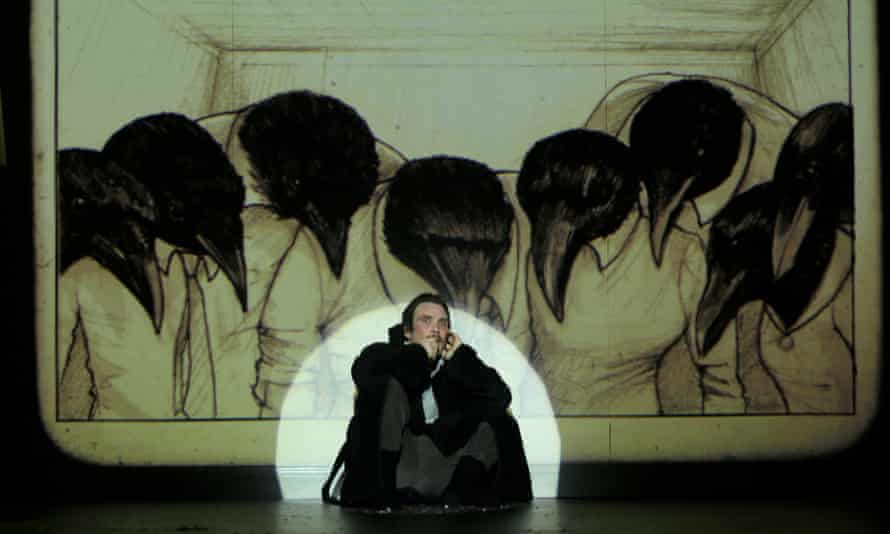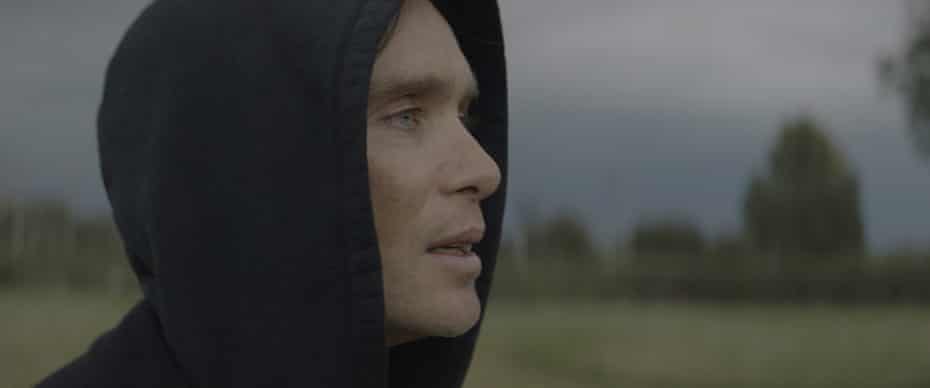When Max Porter and Cillian Murphy first worked together, Murphy got so wired from performing that he couldn’t sleep. The project was a theatrical adaptation of Porter’s novel Grief is the Thing with Feathers, in which a grieving husband and father of two sons is repeatedly visited by a giant crow. Now, the pair have created All of This Unreal Time, a hybrid of film, music and installation. Neither has yet seen the final mix, but Porter says it’s going to be “fucking noisy”. Directed by Aoife McArdle and with music by the National’s Dessner brothers and Jon Hopkins, the piece is a dreamlike confessional monologue exploring guilt, shame and climate disaster.
Cillian Murphy: Grief is the Thing with Feathers was the most satisfying and exhausting thing I have ever done. By a long stretch. Being up there, playing Dad and Crow, going through that cycle of grief every night, was emotionally and psychically draining.
Max Porter: I think to be beaten at ping-pong again and again and again by me must have also been extremely gruelling.
CM: Your arms are far too long – you have an unfair advantage.
MP: Ha.
CM: I still haven’t recovered properly enough to go back on stage. I remember when we talked about doing All of This Unreal Time. I was blown away by [the script], but I said it can’t be a live thing. It had to be filmed.
MP: We knew we wanted to collaborate. We wanted other skillsets. In the literary world, I think it’s a great shame that the text is limited to the copyright-bound object to be sold. I’m much more interested in getting the text up and walking in the room, sharing the meaning of the piece.

CM: You were like that with Grief also. You were remarkably open and generous with the text.
MP: To be controlling over it is totally counterproductive. I’m so much more interested now in other people’s thoughts than my own. I’m very familiar with my own and usually wish to escape them.
Kate Wyver: You’re working with Jon Hopkins and the Dessner brothers. What does the piece sound like?
MP: The syntax and the rhythm were intended to be almost like a weather system, with lulls and stormy moments. I wouldn’t know what it sounded like until Cillian was up and performing it. We filmed in these interesting, desolate, postindustrial areas of London. Abandoned high streets, marshes, tunnels. It was really intense and we shot at night. There’s an incredible shot up by the Truman Brewery and Cillian just lies down in the pouring rain in the middle of this street.
CM: That was five o’clock in the morning. I was wet for quite a while.
MP: We were losing words, adding words, to enable Cillian to bring this energy to it as he walked the streets. That was more a musical process than a literary one.
CM: With a monologue, there has to be a musicality to it. When you get to perform it, it has to sing, literally. I do think sometimes rhythm is more important than meaning in performance. Aoife McCardle, who directed the film, has a remarkable ear for music. Mary Hickson, who produced it, is obsessed with music. Everybody on it was a music nerd.
MP: We’ve got this – for want of a less wanky phrase – dynamic syncopation between Cillian’s performance, and the different musical and film elements. There’s a sort of an unfixedness, it’s still moving.
KW: The film follows a man looking back on his life and facing his regrets. It’s a work of fiction, but does some of it come from your own fear and guilt and shame of what being a man means?
MP: Yes. We talked about this, Cillian, in changes in the cinema world and the era of #MeToo, and how one reconciles oneself with the things that one is deeply uneasy about in the industries that we work in, and the work that one individual can do.
CM: Max has three boys, I have two boys. We’re raising boys in this world – that weighs on me a lot. In my interpretation, that was definitely on my mind.
MP: Yeah, boys as potential weapons, button-pressers. Raising them in the age of climate emergency, nuclear warheads, populism. What the responsibilities are, but also how to give these boys a sense of our limitless love for them and the scale of things in this world that they can be interested and charmed and enchanted by. It’s sort of a pained love letter to boyhood.
KW: Being a parent must be the scariest thing in the world.

CM: My boys are teenagers now, which is kind of extraordinary. It is scary, but it’s so rewarding and brilliant and remarkable and beyond your control, a lot of it. They arrived as their own people, and your job is to just kind of steer them the right way as best you can.
MP: Sometimes that seems beautifully achievable, doesn’t it? And other times it just seems preposterously beyond our grasp.
KW: Cillian, do you wish that Max would just write something happy for you to perform?
CM: [Laughs] I find it a deeply hopeful piece – same with Grief. The stuff I’ve always been drawn to in character, in the books I read, or in films and paintings, is seeing humans come through things. I like seeing people under pressure. I’ve always felt that in order for drama to be stimulating or affecting, you have to go through some fire. That’s probably why I don’t do romantic comedies too often.
MP: There’s a couple of funny lines, isn’t there?
CM: I hope so!
MP: Life is blackly funny, I think. But someone read this text recently and said it seemed to be not necessarily depressing, but from a depressed place. I accept that I probably am, in ecological terms, depressed. I worry that human beings aren’t going to do what they need to do. I think what tends to happen in writing about the climate emergency is people go big and abstract and away from the human being, or it goes right down into making people feel guilty. That seemed to me quite counterproductive. I thought, what would happen if you sort of muddled all those elements?
KW: Do you both feel like you know what you’re doing now, or are you still learning?
CM: I don’t think any artist really knows what they’re doing. We’re just figuring it out all the time. What is nice as you get older, and you have a bit more experience underneath your belt, is that you can reach out to people and collaborate. This project came about just through artists contacting each other directly. There were no intermediates, no agents. It was just artist to artist, and then Manchester international festival came on board and commissioned it. I don’t think there’s enough cross-collaboration between artists.
MP: I don’t wanna be just in my office, scrolling through Amazon reviews of my own work. I’ve loved how much we’ve learned from each other and are still learning.
KW: What’s next?
MP: I am having a bit of a crush on theatre. I’m writing a monologue, playing with [an adaptation of his book The Death of Francis Bacon] for theatre, and working with a theatre director on a project I realised shouldn’t be a novel and turning it into a play. I suppose I want to write play-like novels or make novel-like plays. I think the most progressive ideas about language – who owns it, who performs it, trying to be ambitious with meaning – is on the stage.
CM: All I know is I need to feel that I’m ready to go back and commit to what it takes to go up on stage every night and be open and vulnerable. I think I probably underestimated doing Grief, what it would take from me. I’m so proud of it. I think whatever I do next will have to match that in some way. People often think that in theatre you’re working for two hours in the evening, and then you get the whole day off. It’s the opposite. You’re building up to this thing that you do for two hours the whole day, and then, as was happening for me in Grief, I was so wired emotionally from it, I couldn’t sleep at nighttime. I was doing the performance, not able to sleep, and then all through the day thinking about it. It just consumes you, in a way that for me, during that play, wasn’t healthy. But those two hours on stage were magical. If you ever go “Wasn’t I great in that one?” or “That one was the one” then you’ve a possibility of stagnating or getting nostalgic. You have to keep moving forwards. I love not knowing what will come next.
MP: You’re very good at it mate. You could be a massive arsehole and you’re just not.
CM: Thanks Max, that’s the nicest thing you’ve ever said to me.


Average Rating